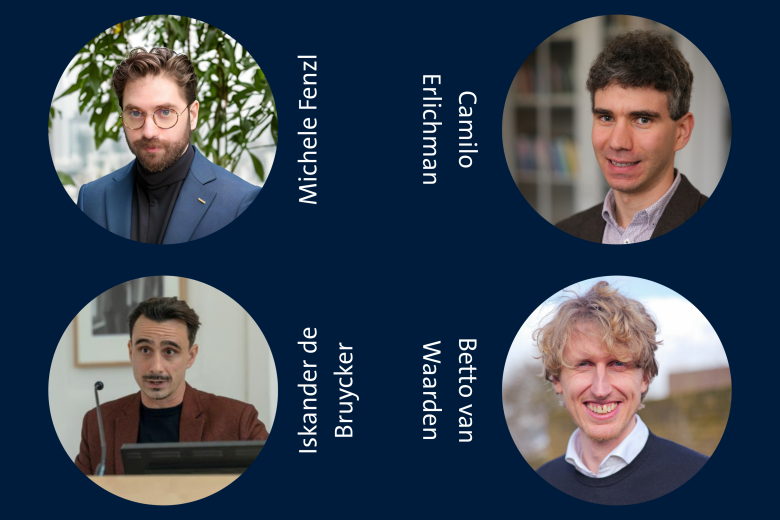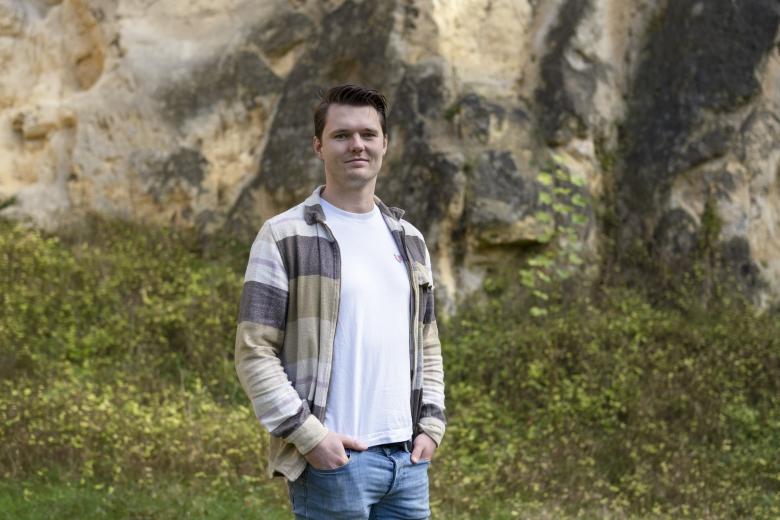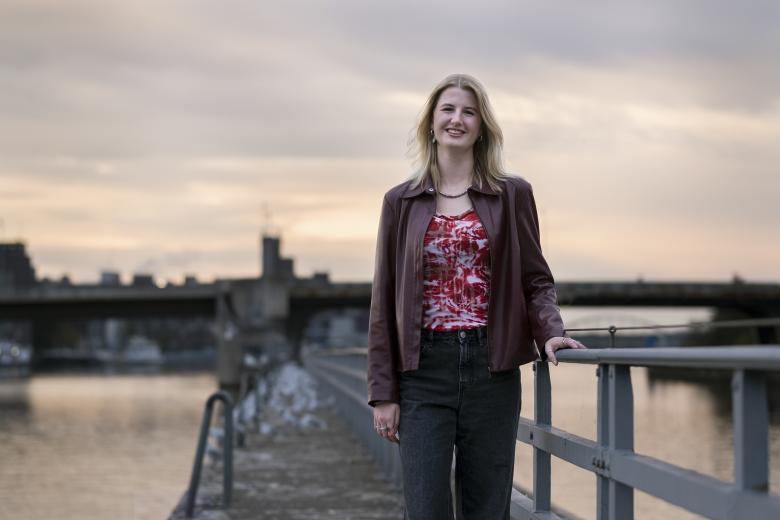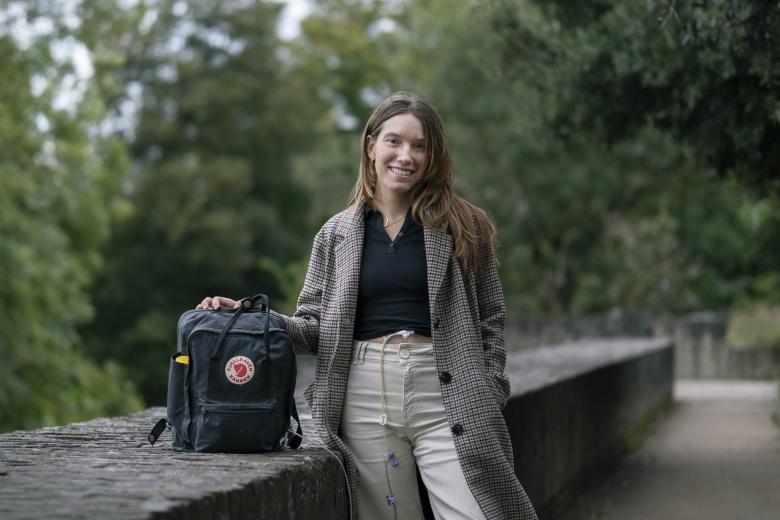Eline: “Are you facing difficulties during your studies? Never hesitate to ask for help”
“Always ask for help when your complaints disproportionately hinder you during your studies.” Based on her own experiences, that is the message Eline wants to convey to every student. In her first year of her bachelor's programme, she suffered from neurological complaints that had a major impact on her studies. She did not have a diagnosis yet, so she felt hesitant to seek support for her issues. She only did so after a teacher insisted. In retrospect, she advises everyone to seek help in time. “I was pleasantly surprised that everyone worked with me to find solutions.”
Symptoms, but no diagnosis
Shortly after Eline started her studies, she began to suffer from neurological complaints. Still, it did not feel obvious to ask for help at the university. “I did have symptoms that really bothered me, but no official diagnosis yet. So it felt like a big step to ask for help. I only did so when I had failed a few subjects, and a teacher came to me to ask if there was more to that. I told him about the symptoms I was experiencing and explained that I was in a medical process. Thanks to that teacher, I then started looking for support at UCM.”
Eline was provided with support in several ways. She says: “The student advisers helped me organise the help I needed and provided a safe space, where I could ask questions and share my concerns about studying with a disability. They also showed me the way to the right resources at the university.”
Combining studies and treatment
Eventually, doctors were able to diagnose Eline with a Functional Neurologic Disorder (FND). To learn to cope with her diagnosis, she needed a care process. This took place in her hometown in the north of the Netherlands, which is not close to Maastricht. “That was something I needed to figure out,” Eline says. “I wanted to continue my studies, but the treatments took a lot of time and the travel distance was long. I had to go home for the treatment every week.”
Fortunately, Eline was already in contact with the study advisers at the time, who advised her on several matters. She explains: “We discussed the options to miss lectures, do replacement assignments or retake exams if I was unable to attend due to illness or treatment. It was very valuable to have someone to brainstorm with. If it had not been possible to sometimes miss lectures or exams, I would have had to discontinue my studies because of the treatment. Fortunately, I didn’t have to.”
The text continues below the photo.

Take your problems seriously
Eline would like to tell other students how important it is to seek support when you’re facing difficulties. “Don’t hesitate to ask for help if your symptoms interfere with your studies, even if their cause is still unknown. You invest a serious amount of time and money in your studies, and it’s also important that you have fun during your time as a student. Find out what support is available, because there are plenty of options.”
“You can even apply for financial aid!”, Eline emphasises. “Falling behind on your studies due to your disability can be financially challenging. In that case, you might be eligible for financial support from, for example, the UM ‘Profileringsfonds’. At first, I thought I did not qualify for this and that I had to solve things on my own. My study adviser advised me to apply for the grant anyway, and when I did, it turned out that I was eligible for financial compensation after all. That provided a lot of relief, which, among other things, created more space to follow my treatment.”
Studying abroad
Meanwhile, Eline has grown enormously in how she copes with her situation. “I now know what the university can do for me and I have become better at asking for help.” Last year, Eline even took a big step: she studied in Germany for a year. “I was quite nervous about it, but I really wanted to do this. So, I contacted the German university and explained the challenges I was facing and what helps me to cope with them. Therefore, we were able to arrange my attendance beforehand. My time studying in Germany was an experience I will never forget.”
“You invest a serious amount of time and money in your studies, and it’s also important that you have fun during your time as a student. Find out what support is available, because there are plenty of options.”
ElineTips for studying with a disability
Are you also facing difficulties during your studies? Eline has a few tips for you, so you can find the right support:
Don't know who to go to with your problems? Contact a teacher or study advisor first. They can always refer you to the right person.
Contact Disability Support if you have a disability and/or chronic illness and need support during your studies. You can also contact Disability Support if you are still in the diagnostic phase of a disability and/or chronic illness.
If you are studying at University College Maastricht, the student counselors of UCM are a good entry point. But you can also approach Disability Support directly.
Have a look at Hogeronderwijstoegankelijk.nl (in English: Higher education accessible). Here you will find extensive information about studying with a disability. This can be useful when you contact the university.
Will you face financial challenges if you are delayed in your studies due to your disability? Explore the options for financial support, such as the UM Profileringsfonds. Consult with your study adviser or the UM student dean to see if you are eligible.
Do you want to study abroad even though you have a disability? Proactively tell us what you need to be able to study effectively. Ask UM whether you need to arrange your needs via UM or with the foreign university.
Text: Romy Veul
Photography: Joris Hilterman
Read more stories about studying with a disability
Also read
-
Four FASoS researchers awarded NWO XS grants
How do lobbyists use disinformation to sway policymakers? Who gets to shape the historical narrative of occupation and violence? Does growing inequality change the way citizens think about politics? And how have politicians defended “truth” across a century of media revolutions?
-
Reducing the Digital Divide: Empowering Students to Train, Evaluate, and Use AI Text Models
The Maastricht Law and Tech Lab, together with the Brightlands Institute for Smart Society (BISS), obtained a € 100.000 a Comenius Senior Teaching Fellow grant.
-
Green school playgrounds boost concentration and wellbeing
Children at schools with green playgrounds are better able to concentrate and display more social behaviour. This is the conclusion of a follow-up study within the long-running project The Healthy Primary School of the Future .


